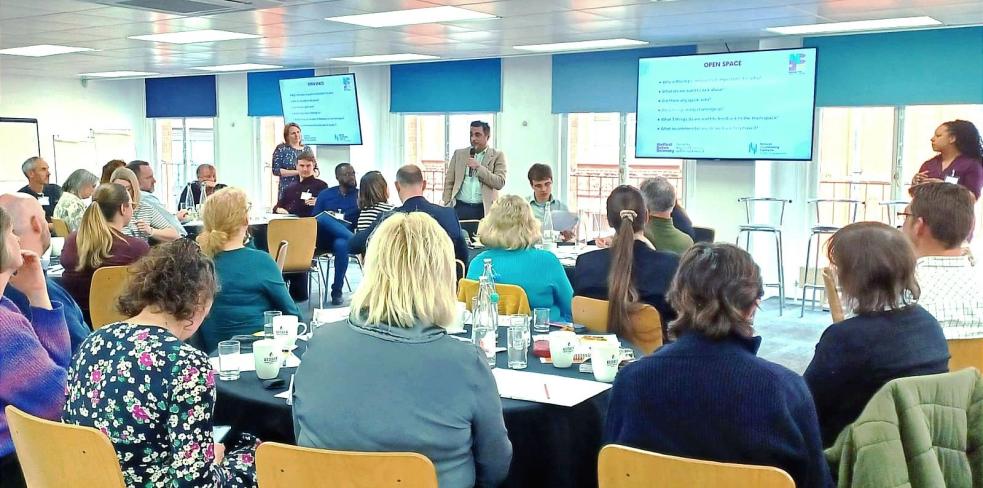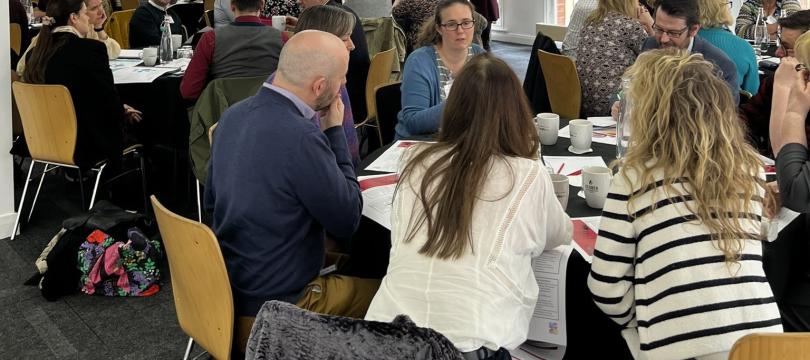Bridging Academic Perspectives and Community Engagement
Ayad Al-Ani, London Central Academy Director and member of StaffsCAN, a Civic and Community Advisory Network, at Staffordshire University, blogs about his journey so far with The National Civic Impact Accelerator Programme (NCIA)

In the heart of Staffordshire, a transformative partnership between the local community and Staffordshire University is flourishing through the Staffs CAN initiative. Launched in November 2022, Staffs CAN embodies the spirit of collaboration and civic engagement, striving to empower communities and foster meaningful change. As a community member deeply involved in this initiative, my journey took an unexpected turn when Staffordshire University was selected to participate in the National Civic Impact Accelerator Programme (NCIA).
The NCIA initiative, aimed at increasing universities' influence in specific areas while enhancing capacity within institutions and among partners, opened new avenues for engagement and learning. Stepping into the first NCIA session in September 2023, I found myself amongst academic perspectives that were not always transparent. However, I was impressed by the coordination and organisational efforts exerted by the NCCPE team, particularly in facilitating the initial stages of team formation, from 'forming' to 'storming'.
Amidst uncertainties, a crucial dichotomy emerged:
- On one hand, the imperative to share local experiences within a broader national framework for academic review, and on the other,
- The necessity to grasp the essence of the Civic initiative and its potential to accelerate Staffordshire University's existing efforts through Staffs CAN.
As NCIA sessions progressed through online meetings and workshops, the gap between academic discourse and community engagement began to narrow. The opportunity to select a learning group topic, "Measuring Civic Impact," was pivotal, aligning with my belief in the importance of quantifying impact to guide community action effectively. Bringing the Civic discussion back to my community members, many of whom face barriers including lack of confidence, language, and access to information technologies, we defined Civic engagement as the process of building and continuously improving locally beneficial relationships, with civic impact representing the tangible outcomes of such exchange.
Attending the second in-person NCIA day in April 2024, I witnessed the evolution of discussions with partners from other institutions. Here, two streams of knowledge converged:
- The focused knowledge of a given action learning group which is across universities, and
- B) The knowledge of a given university partner whose members are part of different NCIA action learning groups.
Preparing for Phase 2 of the programme
The NPCCE have demonstrated inclusivity by providing a platform for community perspectives. Through collaborative dialogue, one identified gap was the need for a Social Return on Investment (SROI) tool—a moment where academia, community representatives, NPCCE, and peers from other partnerships congregated to chart a roadmap for future research.
That support for the SROI proposal stems from the recognition that local community organisations often lack the methodology to articulate their funding needs in a language that resonates with funders' reasoning. By implementing SROI, stakeholders stand to benefit in several ways:
- For community organisations, collecting meaningful data through SROI can help them access funding and therefore thrive, as it provides evidence of the social and economic value they generate.
- Funders can use SROI to ensure the value of their investment pays off, as it offers a clear understanding of the return on investment in terms of social outcomes.
- Universities can harvest data viable for current and future relevant research through SROI, contributing to a deeper understanding of community impact and effective engagement strategies.
- For community members, prioritising the articulation of gains through SROI results in an enhanced end-user experience, as it emphasises the tangible benefits accrued to individuals within the community.
Furthermore, the adoption of SROI aligns with the principles of accountability and transparency, fostering trust and collaboration among stakeholders. By quantifying social and economic value, SROI empowers communities to advocate for their needs and priorities with evidence-backed arguments, amplifying their voice in decision-making processes.
In addition to its practical benefits, SROI embodies a values-driven approach that resonates deeply with the ethos of community engagement. By valuing social and environmental outcomes alongside financial returns, SROI reflects a commitment to holistic decision-making and sustainable development. This ethos aligns with the principles of community empowerment and participatory representation, empowering individuals and organisations to shape their own futures. Through the NCIA programme, the universities and their partners are not only pioneering innovative methodologies, but also fostering a culture of social responsibility and collective stewardship.
I am not sure what the end result might be, but as we move forward in the NCIA programme, I am optimistic about the potential of this momentum to catalyse positive change and drive sustainable development. By bridging academic expertise with community engagement, we can create a more inclusive and equitable society, where every voice is heard, and every contribution is valued.
And “Yes!” we can continue to harness the power of collaboration and collective action, building a brighter future for generations to come, but in what other ways can we amplify the voices of underrepresented communities in the ongoing discourse on civic engagement and academic collaboration?

